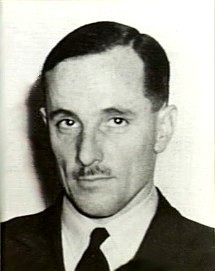
Back جو هيويت Arabic جو هيويت ARZ Joe Hewitt Spanish Joe Hewitt ID Joe Hewitt Polish Joe Hewitt Portuguese
Joe Hewitt | |
|---|---|
 Air Commodore Hewitt, 1942 | |
| Born | 13 April 1901 Tylden, Victoria |
| Died | 1 November 1985 (aged 84) Melbourne |
| Allegiance | Australia |
| Service | |
| Service years | 1915–1956 |
| Rank | Air Vice-Marshal |
| Commands |
|
| Battles / wars |
|
| Awards | Commander of the Order of the British Empire |
| Other work |
|
Air Vice-Marshal Joseph Eric Hewitt, CBE (13 April 1901 – 1 November 1985) was a senior commander in the Royal Australian Air Force (RAAF). He joined the Royal Australian Navy in 1915, and transferred permanently to the Air Force in 1928. Hewitt commanded No. 101 (Fleet Cooperation) Flight in the early 1930s, and No. 104 (Bomber) Squadron RAF on exchange in Britain shortly before World War II. He was appointed the RAAF's Assistant Chief of the Air Staff in 1941. The following year he was posted to Allied Air Forces Headquarters, South West Pacific Area, as Director of Intelligence. In 1943, he took command of No. 9 Operational Group, the RAAF's main mobile strike force, but was controversially sacked by the Chief of the Air Staff, Air Vice Marshal George Jones, less than a year later over alleged morale and disciplinary issues.
Described as a "small, dapper man",[1] who was "outspoken, even 'cocky'",[2] Hewitt overcame the setback to his career during the war and made his most significant contributions as Air Member for Personnel from 1945 to 1948. Directly responsible for the demobilisation of thousands of wartime staff and the consolidation of what was then the world's fourth largest air force into a much smaller peacetime service, he also helped modernise education and training within the RAAF. Hewitt was appointed a Commander of the Order of the British Empire in 1951, the same year he became Air Member for Supply and Equipment. Retiring from the military in 1956, he went into business and later managed his own publishing house. He wrote two books including Adversity in Success, a first-hand account of the South West Pacific air war, before his death in 1985 aged 84.